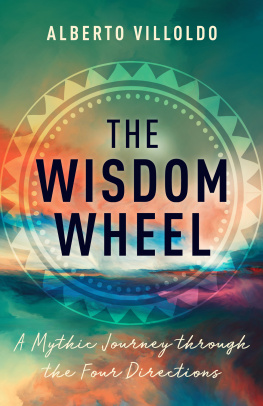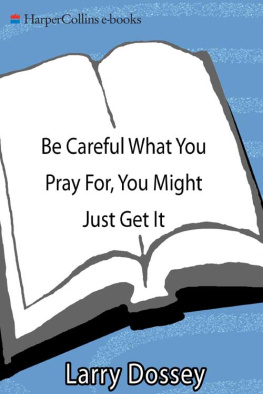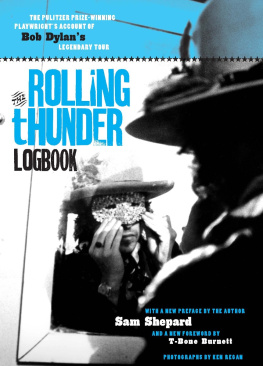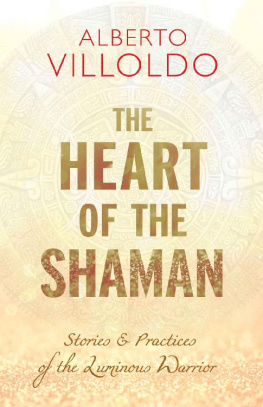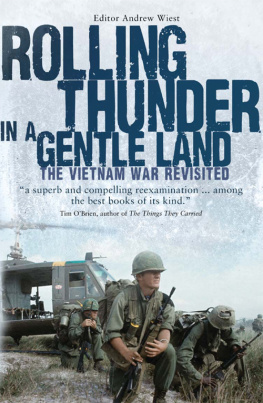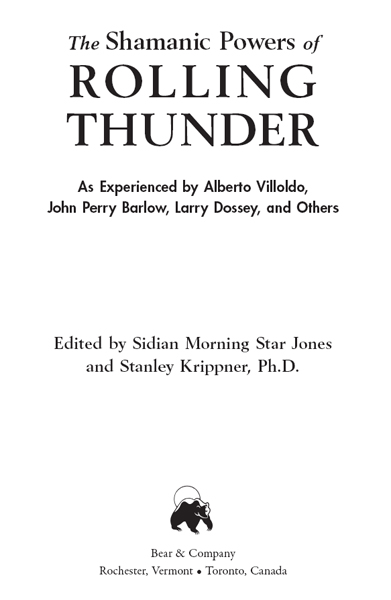Sidian Jones dedicates this book to Stanley Krippner, the only person to fully accept me for who I am.

Stanley Krippner dedicates this book to Richard Adams,Thom Denomme, Betsy Easton, Harry Easton, Donna Eden, Howard Eisenberg, David Feinstein, Jay Friedheim, Kim Glenney,Scott Glenney, Bob Hieronimus, Zohara Hieronimus, Bob Hoss, Russell Jaffe, John Koo, Phil Pollack, Jimmy Smull, Gert Reutter,and Michael Winkler, who know the reasons why.
The Shamanic Powers of
ROLLING THUNDER
These first-person encounters with one of the most intriguing figures of recent American history are by turn frightening, amusing, informative, touching, and mystifying. Rolling Thunders healing and wisdom were sought after by characters as diverse as members of the Grateful Dead, Muhammed Ali, and Buckminster Fuller. The authors have done us all a huge service by collecting these extraordinary accounts of a remarkable man.
CHRISTOPHER RYAN, PH.D., COAUTHOR OF THE NEW YORK TIMES BESTSELLER SEX AT DAWN
For any person who wants to expand their knowledge of rare and extraordinary powers and healing abilities exhibited by few on our planet and to learn of the remarkable Rolling Thunders adept expression and application of such abilitiesthis book is a mustread. Jaw-dropping awe and wonder will be a common response from many! And what a privilege to be reading compelling firsthand accounts by individuals who, each in their own right, contribute greatly to the education, upliftment, and enlightenment of many.
DEBBIE JOFFE ELLIS, M.D.A.M., PSYCHOLOGIST AND ADJUNCT PROFESSOR OF PSYCHOLOGY AT COLUMBIA UNIVERSITY
More than four decades have now passed since I first heard Rolling Thunder speak at a symposium in San Francisco sponsored by the Association for Humanistic Psychology. I have no doubt that Rolling Thunders presence at this gathering of open-minded academics and therapists had been facilitated by Stanley Krippner. So, it is both fascinating and heartening to see that, so many decades later, Krippner and his fellow consciousness explorers are still grappling with the spiritual mysteries, social implications, and theoretical dilemmas that have followed in the wake of Rolling Thunders brilliant career as a Native American shaman. This book exhibits a depth of understanding beyond that of previous treatments. I highly recommend it.
JEFFREY MISHLOVE, PH.D., HOST OF NEW THINKING ALLOWED VIDEO CHANNEL
The legendary Native American shaman Rolling Thunder captured the imagination of musicians, writers, and artists during his lifetime, and his legacy continues to inspire and captivate readers from all walks of life.... [a] fascinating retrospective look at a uniquely iconic medicine man. Simply put, youre in for a treat. Tune in, turn on, and read The Shamanic Powers of Rolling Thunder.
STUART FISCHER, M.D., AUTHOR OF THE PARK AVENUE DIET
Krippner and Jones have assembled a fascinating and inspiring tribute to Rolling Thunder. To be a living prayer is what The White Buffalo Calf Woman of the Lakotas brought to all people. Rolling Thunder lived this truth, and the elements of nature responded in kind as so many people recount herein. His legacy reminds us all that each humans capacity and purpose, is to shamanize, to be a co-creator.
J. ZOHARA MEYERHOFF HIERONIMUS, D.H.L., AUTHOR OF THE FUTURE OF HUMAN EXPERIENCE AND COHOST OF 21ST CENTURY RADIO
An essential companion volume to The Voice of Rolling Thunder for anyone wanting to understand his life, the lives of those he touched, and the variety of disciplines he influenced.
MARK A. SCHROLL, PH.D., EDITOR OF TRANSPERSONAL ECOSOPHY, VOL. 1: THEORY, METHODS, AND CLINICAL ASSESSMENTS
Acknowledgments
The authors acknowledge the support of the Saybrook Chair for the Study of Consciousness for its financial support of this books preparation. They would also like to thank Steve Hart and Rosemary Coffey for their editorial services and hard work, and Ron Boyer, Clint Evans, Katharine Fletcher, and Nina Zabelin for their work done on our previous Rolling Thunder book. The authors would also like to thank Jrgen Kremer for allowing us to use several of the drawings he executed during a visit to Meta Tantay.

The more power you have, the more careful you have to be.
ROLLING THUNDER
FOREWORD
Rolling Thunder as a Transpersonal and Transcultural Exemplar
Harris Friedman, Ph.D.
HARRIS FRIEDMAN, PH.D., is a practicing clinical and organizational consulting psychologist, as well as an active researcher. He recently retired as research professor of psychology at the University of Florida, where he remains on its courtesy faculty, and now teaches part-time at Goddard College, as well as supervises dissertations at several other universities. He has more than two hundred professional publications, many appearing in top scientific journals and garnering international media coverage. His most recent books include Transcultural Competence (2015), The Praeger Handbook of Social Justice and Psychology, Vols. 13 (2014), and The Wiley-Blackwell Handbook of Transpersonal Psychology (2013). He is also senior editor of the International Journal of Transpersonal Studies and associate editor of The Humanistic Psychologist. As a Fellow of the American Psychological Association, he recently received the Abraham Maslow Award given to an individual for an outstanding and lasting contribution to the exploration of the farther reaches of human spirit.

Rolling Thunder was a controversial Native American medicine man who passed away in 1997. He received considerable notoriety as a person who straddled both traditional Native American and modern Western culture, being willing to share his beliefs with all who came seeking healing and wisdom. This occurred during a time in which many cultural barriers were breaking down, as formerly insular beliefs began to be shared with the larger world. As an example, Bruce Lee, a charismatic Chinese kung fu practitioner, was initially criticized, and even physically accosted, by other Chinese kung fu masters for being one of the first from his tradition to teach this martial art outside of the Chinese community from which it arose (Gong 2014). Similarly, Rolling Thunders willingness to share his teachings across cultural divides with the larger community of all people was noteworthy, and became a source of concern for some in Native American communities who did not want sacred knowledge transmitted to members of groups considered oppressive to Native Americans.
Although Rolling Thunder was a ceaseless advocate for Native American causes and was fully aware of the holocaust perpetrated upon Native people in America, he welcomed all with a warm embrace. In addition, he was able to focus his teachings and healings in ways that made them accessible to people who did not share his cultural background and, in this vein, exhibited a rare transcultural competence, an ability to recognize and respect cultural differences, as well as to reconcile them in ways that realized a beneficial and sustainable outcome for all (Glover and Friedman 2015). Insofar as his expressed stance toward reality was greatly expanded, as compared to the prevailing Western understandings, he also serves as an exemplar of a transpersonal approach (Friedman and Hartelius 2013), referring to his world view in which the profound interconnectedness of all reality was held paramount.


